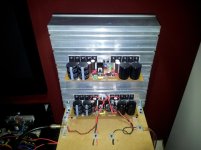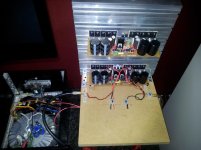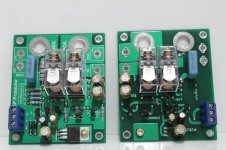Yes Bimmer, it's a stereo unit. Since I was building a dual-mono amp, I was worried about the share of this component by the two channels. The cross-channel talk due to this component is negligible.
A.Wayne, my Hx amp has a power-on thump. It also has a power-off delay due to the DC voltage that depletes progressively as the caps discharge. When the speakers are directly connected to the boards, I can have music for as long as 30 seconds after disconnecting the unit, just because of the voltage reservoirs, or just a few seconds when it's playing louder...
Many high-ends or high-power power-amps have this kind of circuitry, either with electro-mechanical components (relays) or by other solid-state means.
This circuit may have saved my speakers already, I explain: I was connecting / disconnecting my speakers while music was playing (rather loud), and guess what? I briefly shorted the amp output without noticing. It blew only ONE of the on-board fuses, thus only throwing the negative portion of the sine-wave to the speaker. This protection crcuit instantly disconnected both speaker outputs, preventing any damage to the speakers themselves. After replacing the blown fuse, everything was back to normal.
Nota: I don't make any money by suggesting this (hahaha) 🙂
Martin.
A.Wayne, my Hx amp has a power-on thump. It also has a power-off delay due to the DC voltage that depletes progressively as the caps discharge. When the speakers are directly connected to the boards, I can have music for as long as 30 seconds after disconnecting the unit, just because of the voltage reservoirs, or just a few seconds when it's playing louder...
Many high-ends or high-power power-amps have this kind of circuitry, either with electro-mechanical components (relays) or by other solid-state means.
This circuit may have saved my speakers already, I explain: I was connecting / disconnecting my speakers while music was playing (rather loud), and guess what? I briefly shorted the amp output without noticing. It blew only ONE of the on-board fuses, thus only throwing the negative portion of the sine-wave to the speaker. This protection crcuit instantly disconnected both speaker outputs, preventing any damage to the speakers themselves. After replacing the blown fuse, everything was back to normal.
Nota: I don't make any money by suggesting this (hahaha) 🙂
Martin.
my Hx amp has a power-on thump. It also has a power-off delay due to the DC voltage that depletes progressively as the caps discharge. When the speakers are directly connected to the boards, I can have music for as long as 30 seconds after disconnecting the unit, just because of the voltage reservoirs, or just a few seconds when it's playing louder...
My DX Blame does the same thing. A power-on thump, and a "burp" after a long delay after power-off. Maybe I should get me one of those protection circuits too.
Power on thump may be normal in most amps , not so on turn off..
I have /had many amps over the years and most not all exhibited some kind of on thump, all barely obtrusive, never had one make noise on turn off and non had speaker relays.
I have /had many amps over the years and most not all exhibited some kind of on thump, all barely obtrusive, never had one make noise on turn off and non had speaker relays.
Rudi,
the postman is on his way - as fast as he can.
Do not forget the lift-off resistor on the 2nd board.
Best regards - Rudi
the postman is on his way - as fast as he can.
Do not forget the lift-off resistor on the 2nd board.
Best regards - Rudi
What do you all think of these Speaker Protection Modules?
Because I have mono-blocks this seems to me a good solution.
2x Mono Speaker Protection Module - each for on Channel:
2x Mono Speaker Protection Module - each for on Channel | eBay
Regards,
Rudy
Because I have mono-blocks this seems to me a good solution.
2x Mono Speaker Protection Module - each for on Channel:
2x Mono Speaker Protection Module - each for on Channel | eBay
Regards,
Rudy
Attachments
you only need speaker protection modules AFTER you have completed all your testing.
Then they can be a very good idea.
Then they can be a very good idea.
Yes that was also my intention, but is there difference in these modules and where do I need special attention.
Regards,
Rudy
Regards,
Rudy
Last edited:
I only wanted to know is this a good design.
If you guys give me the green light I go for this one and order these speaker protection modules.
@ Rudi, the 2 x MJE 15030 has arrived. thanks
Regards,
Rudy
If you guys give me the green light I go for this one and order these speaker protection modules.
@ Rudi, the 2 x MJE 15030 has arrived. thanks
Regards,
Rudy
Last edited:
Wayne with a 1 ohm speaker loads the discharge from your power suppy would be to fast for you to hear. Evette
Ok, even with 200k/uf/ch , also only 1 ohm above 300 hz . still yet can this only be solved with these add on's ?
My other systems have speakers that are 8 ohm nom so this could be an issue if I decide to use them there ...
My other systems have speakers that are 8 ohm nom so this could be an issue if I decide to use them there ...
get them they can only protect your speakers. 1 onuce of prevention is worth more than a pound of cure. evette
get them they can only protect your speakers. 1 onuce of prevention is worth more than a pound of cure. evette
My understanding such devices hurt sonics , no..? if so I prefer smoke to bad sonics ....😛
- Status
- Not open for further replies.
- Home
- Amplifiers
- Solid State
- Dx Blame MKIII-Hx - Builder's thread




